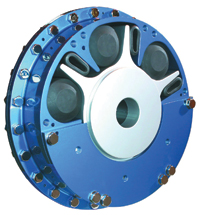
Posted to News on 21st Sep 2015, 00:00
Couplings cure destructive vibration on generator sets
Rubber-in-compression couplings are ideal for protecting diesel and gas driven generators from torsional vibration and the possible catastrophic effects of resonance occurring if this were to coincide with the natural frequency of the system.

>Torsional vibration is an inherent feature of any internal combustion engine as pulses, or peaks in torque, occur as the pistons are driven on their power strokes when the fuel and air mixture ignites. Each pulse, or peak in torque, results in an imperceptible twisting of the drive shaft, and when large amounts of power are involved the forces involved can be enormous.
>What's more, all physical systems have a natural frequency at which they vibrate - a bit like the sound of a ringing bell. If external forces are applied to a system that coincide with its natural frequency then amplification, known as resonance, will occur. This resonance can be very destructive, as was seen in the famous case of the collapse of the Tacoma Narrows Bridge, USA, in 1940, when the frequency of the wind gusts coincided with the natural frequency of the bridge.
>In the same way, on a diesel-, or gas-engine driven generator set, if the torsional vibration coincides with the natural frequency of the system then the results could be catastrophic, or, at the very least, will reduce component lifetime and significantly increase the level of maintenance and operating costs.
>Rubber-in-compression couplings eliminate these problems as the rubber blocks within the coupling are carefully selected to dampen vibration and move the natural frequency away from the operating speeds of the engine. The couplings provide drive through rubber blocks, which are compressed, and hence the term rubber in compression.
>This type of flexible coupling is maintenance free, intrinsically failsafe, and a better option than rubber-in-shear type flexible couplings that are prone to early fatigue failure on diesel- and gas-driven systems. Capable of operating at temperatures up to 200 degrees C, Renold Hi-Tec's rubber-in-compression couplings also offer misalignment capabilities and blind assembly options if required.








